Self-Care Management Report: Patient Assessment of Illness Care
VerifiedAdded on 2023/06/04
|9
|1422
|484
Report
AI Summary
This report examines self-care management, focusing on patient assessment of chronic illness care and the application of the 5As of nursing (Ask, Advise, Agree, Assist, Arrange). The introduction highlights the importance of self-management support for chronic diseases like diabetes and cardiovascular diseases. The report analyzes patient perceptions of self-care management, utilizing the Patient Assessment of Chronic Illness Care (PACIC) tool to evaluate the quality of healthcare and patient satisfaction. The analysis reveals patient dissatisfaction with monitoring processes, goal settings, and doctor observations after treatment. Strategic recommendations are provided, emphasizing the ethical principles of nursing and the effective utilization of the 5As framework to improve patient outcomes. The conclusion underscores the need for collaboration between healthcare professionals and patients to enhance self-care management practices.
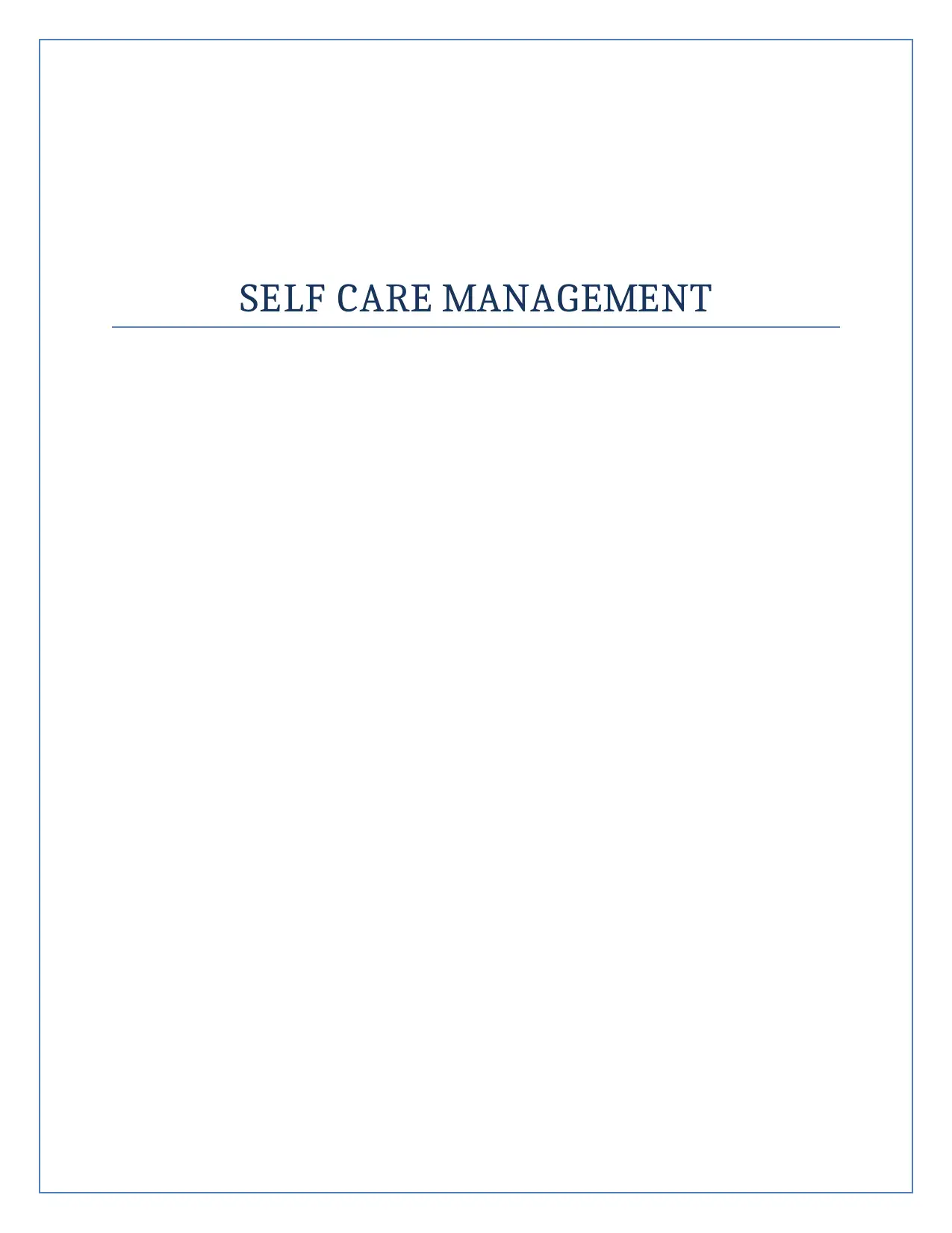
SELF CARE MANAGEMENT
Paraphrase This Document
Need a fresh take? Get an instant paraphrase of this document with our AI Paraphraser
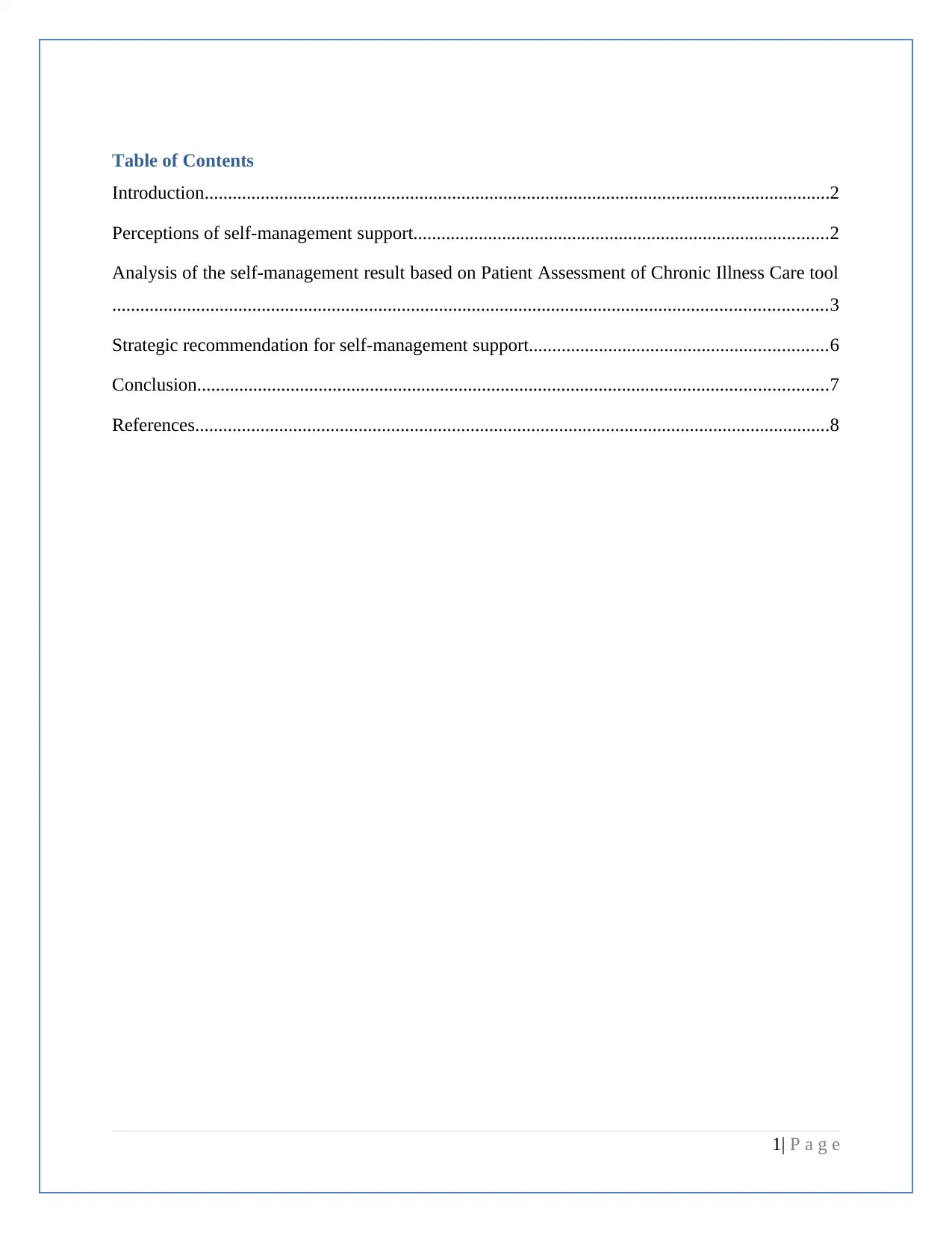
Table of Contents
Introduction......................................................................................................................................2
Perceptions of self-management support.........................................................................................2
Analysis of the self-management result based on Patient Assessment of Chronic Illness Care tool
.........................................................................................................................................................3
Strategic recommendation for self-management support................................................................6
Conclusion.......................................................................................................................................7
References........................................................................................................................................8
1| P a g e
Introduction......................................................................................................................................2
Perceptions of self-management support.........................................................................................2
Analysis of the self-management result based on Patient Assessment of Chronic Illness Care tool
.........................................................................................................................................................3
Strategic recommendation for self-management support................................................................6
Conclusion.......................................................................................................................................7
References........................................................................................................................................8
1| P a g e
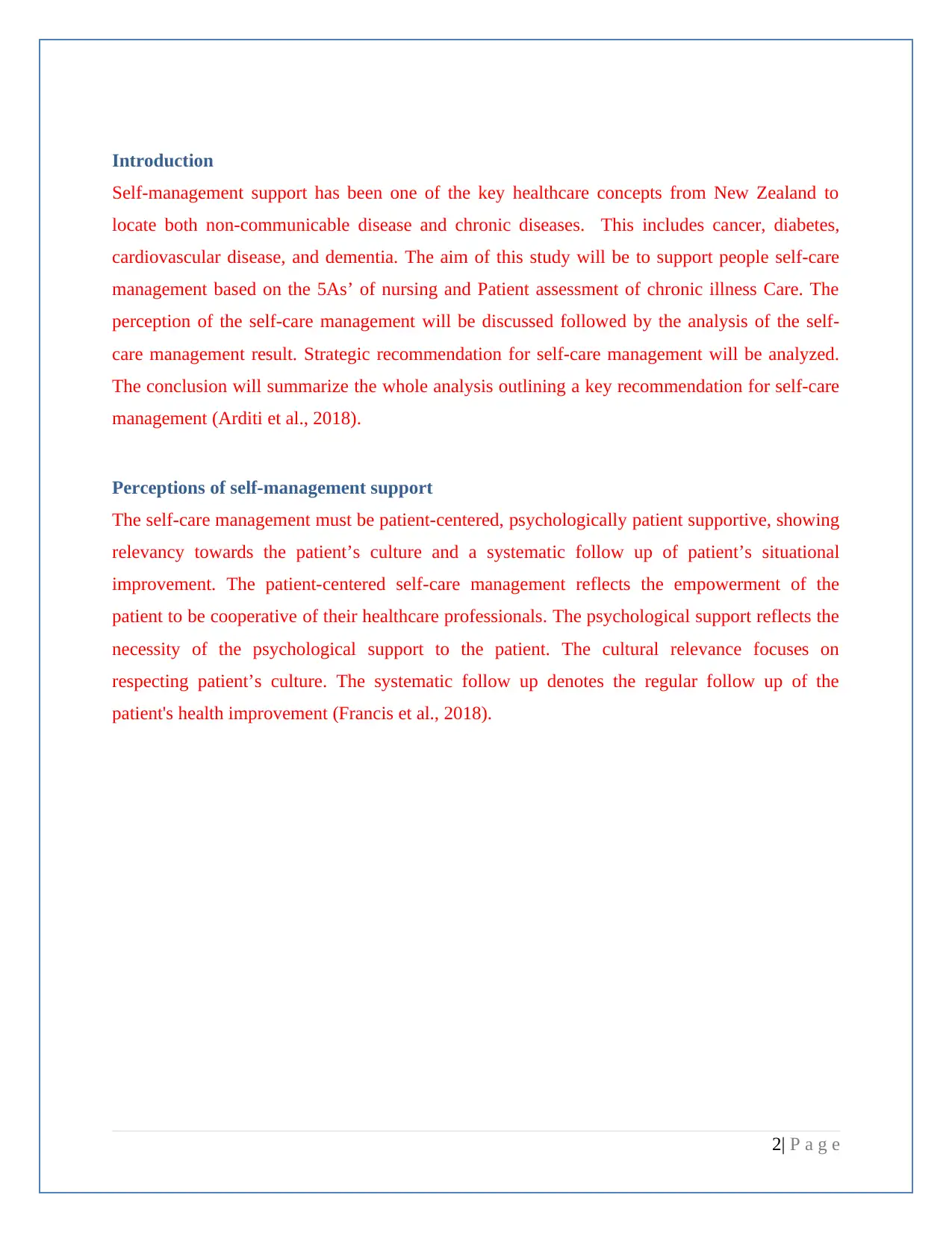
Introduction
Self-management support has been one of the key healthcare concepts from New Zealand to
locate both non-communicable disease and chronic diseases. This includes cancer, diabetes,
cardiovascular disease, and dementia. The aim of this study will be to support people self-care
management based on the 5As’ of nursing and Patient assessment of chronic illness Care. The
perception of the self-care management will be discussed followed by the analysis of the self-
care management result. Strategic recommendation for self-care management will be analyzed.
The conclusion will summarize the whole analysis outlining a key recommendation for self-care
management (Arditi et al., 2018).
Perceptions of self-management support
The self-care management must be patient-centered, psychologically patient supportive, showing
relevancy towards the patient’s culture and a systematic follow up of patient’s situational
improvement. The patient-centered self-care management reflects the empowerment of the
patient to be cooperative of their healthcare professionals. The psychological support reflects the
necessity of the psychological support to the patient. The cultural relevance focuses on
respecting patient’s culture. The systematic follow up denotes the regular follow up of the
patient's health improvement (Francis et al., 2018).
2| P a g e
Self-management support has been one of the key healthcare concepts from New Zealand to
locate both non-communicable disease and chronic diseases. This includes cancer, diabetes,
cardiovascular disease, and dementia. The aim of this study will be to support people self-care
management based on the 5As’ of nursing and Patient assessment of chronic illness Care. The
perception of the self-care management will be discussed followed by the analysis of the self-
care management result. Strategic recommendation for self-care management will be analyzed.
The conclusion will summarize the whole analysis outlining a key recommendation for self-care
management (Arditi et al., 2018).
Perceptions of self-management support
The self-care management must be patient-centered, psychologically patient supportive, showing
relevancy towards the patient’s culture and a systematic follow up of patient’s situational
improvement. The patient-centered self-care management reflects the empowerment of the
patient to be cooperative of their healthcare professionals. The psychological support reflects the
necessity of the psychological support to the patient. The cultural relevance focuses on
respecting patient’s culture. The systematic follow up denotes the regular follow up of the
patient's health improvement (Francis et al., 2018).
2| P a g e
⊘ This is a preview!⊘
Do you want full access?
Subscribe today to unlock all pages.

Trusted by 1+ million students worldwide
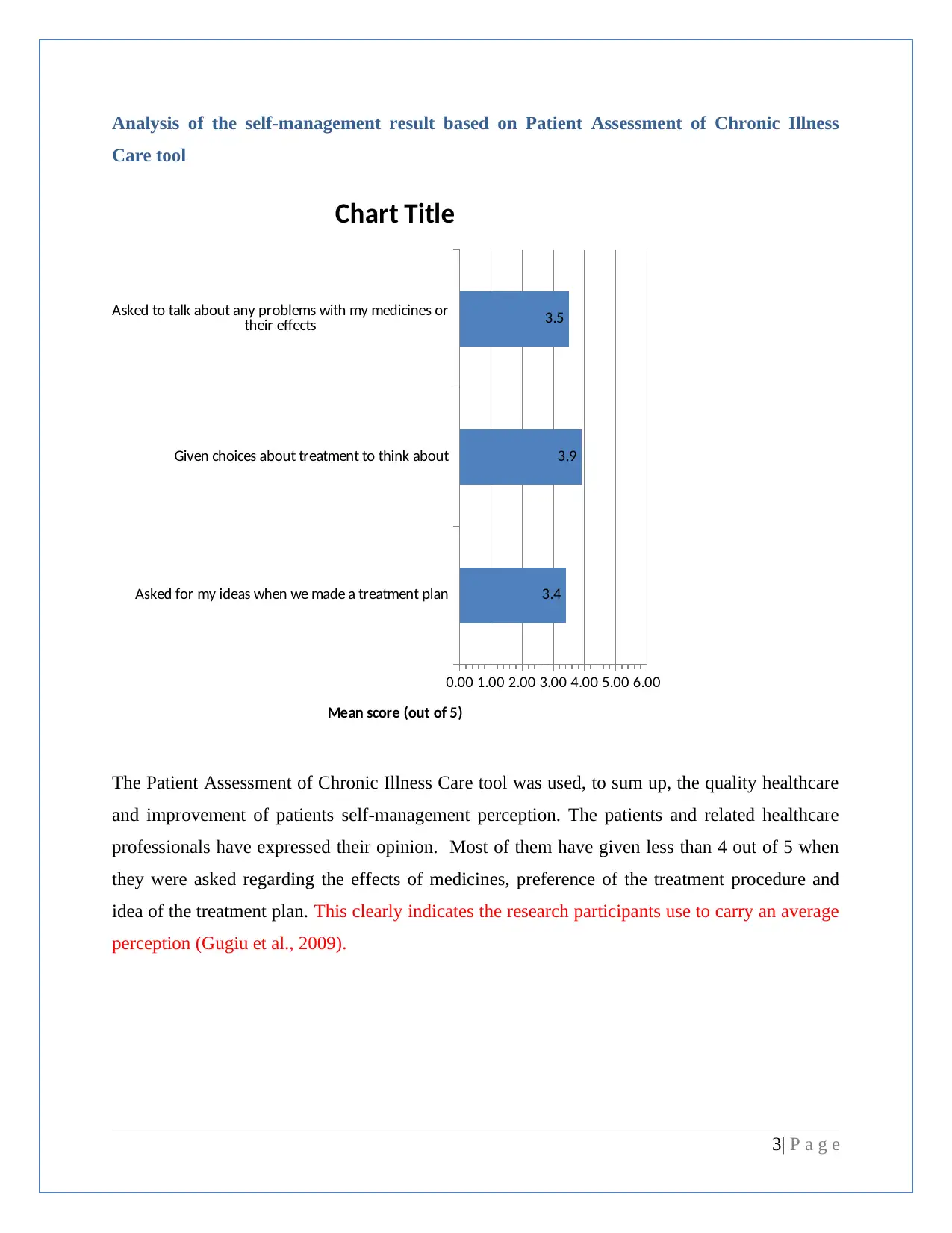
Analysis of the self-management result based on Patient Assessment of Chronic Illness
Care tool
Asked for my ideas when we made a treatment plan
Given choices about treatment to think about
Asked to talk about any problems with my medicines or
their effects
0.00 1.00 2.00 3.00 4.00 5.00 6.00
3.4
3.9
3.5
Chart Title
Mean score (out of 5)
The Patient Assessment of Chronic Illness Care tool was used, to sum up, the quality healthcare
and improvement of patients self-management perception. The patients and related healthcare
professionals have expressed their opinion. Most of them have given less than 4 out of 5 when
they were asked regarding the effects of medicines, preference of the treatment procedure and
idea of the treatment plan. This clearly indicates the research participants use to carry an average
perception (Gugiu et al., 2009).
3| P a g e
Care tool
Asked for my ideas when we made a treatment plan
Given choices about treatment to think about
Asked to talk about any problems with my medicines or
their effects
0.00 1.00 2.00 3.00 4.00 5.00 6.00
3.4
3.9
3.5
Chart Title
Mean score (out of 5)
The Patient Assessment of Chronic Illness Care tool was used, to sum up, the quality healthcare
and improvement of patients self-management perception. The patients and related healthcare
professionals have expressed their opinion. Most of them have given less than 4 out of 5 when
they were asked regarding the effects of medicines, preference of the treatment procedure and
idea of the treatment plan. This clearly indicates the research participants use to carry an average
perception (Gugiu et al., 2009).
3| P a g e
Paraphrase This Document
Need a fresh take? Get an instant paraphrase of this document with our AI Paraphraser
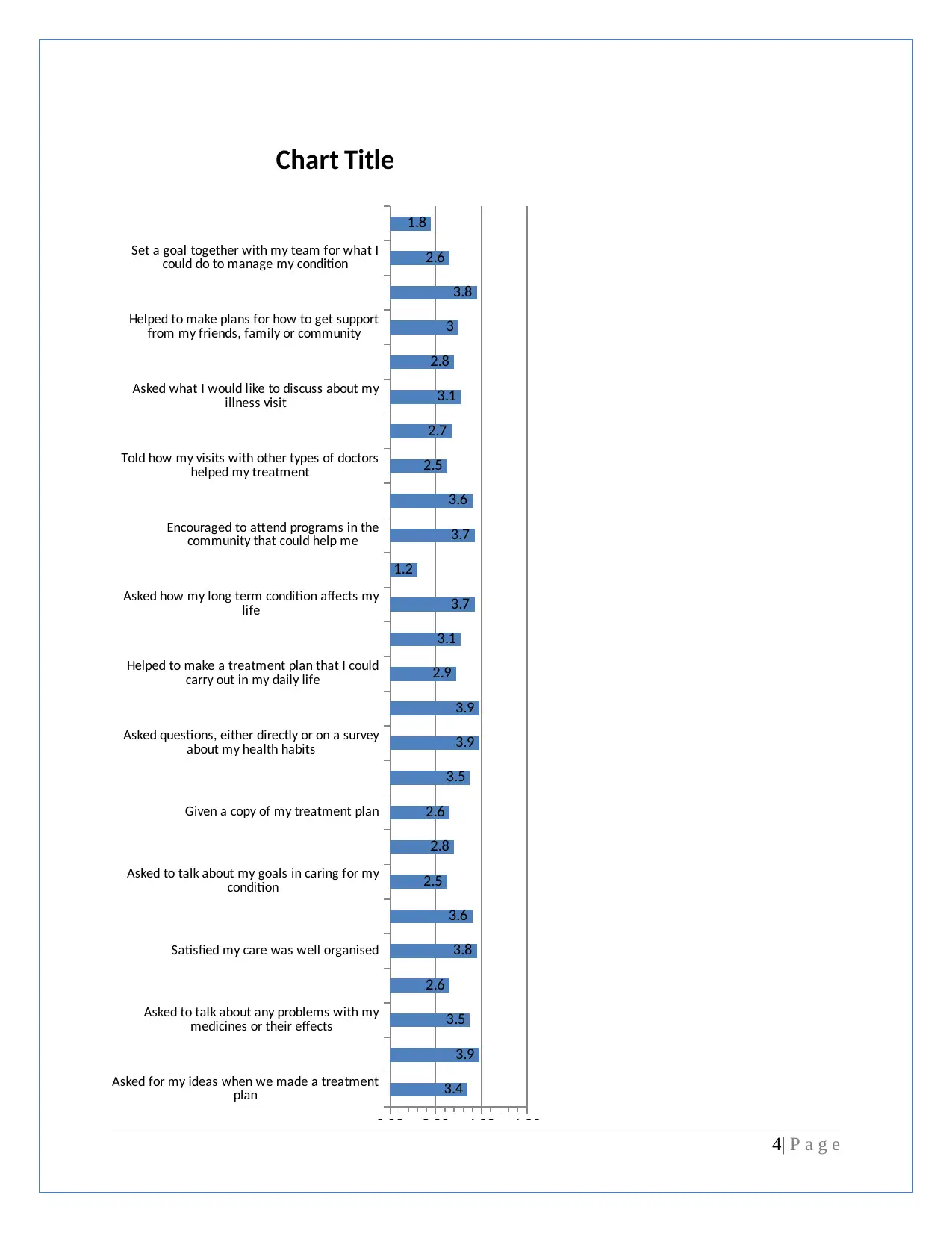
Asked for my ideas when we made a treatment
plan
Asked to talk about any problems with my
medicines or their effects
Satisfied my care was well organised
Asked to talk about my goals in caring for my
condition
Given a copy of my treatment plan
Asked questions, either directly or on a survey
about my health habits
Helped to make a treatment plan that I could
carry out in my daily life
Asked how my long term condition affects my
life
Encouraged to attend programs in the
community that could help me
Told how my visits with other types of doctors
helped my treatment
Asked what I would like to discuss about my
illness visit
Helped to make plans for how to get support
from my friends, family or community
Set a goal together with my team for what I
could do to manage my condition
0.00 2.00 4.00 6.00
3.4
3.9
3.5
2.6
3.8
3.6
2.5
2.8
2.6
3.5
3.9
3.9
2.9
3.1
3.7
1.2
3.7
3.6
2.5
2.7
3.1
2.8
3
3.8
2.6
1.8
Chart Title
Mean Score (out of 5)
4| P a g e
plan
Asked to talk about any problems with my
medicines or their effects
Satisfied my care was well organised
Asked to talk about my goals in caring for my
condition
Given a copy of my treatment plan
Asked questions, either directly or on a survey
about my health habits
Helped to make a treatment plan that I could
carry out in my daily life
Asked how my long term condition affects my
life
Encouraged to attend programs in the
community that could help me
Told how my visits with other types of doctors
helped my treatment
Asked what I would like to discuss about my
illness visit
Helped to make plans for how to get support
from my friends, family or community
Set a goal together with my team for what I
could do to manage my condition
0.00 2.00 4.00 6.00
3.4
3.9
3.5
2.6
3.8
3.6
2.5
2.8
2.6
3.5
3.9
3.9
2.9
3.1
3.7
1.2
3.7
3.6
2.5
2.7
3.1
2.8
3
3.8
2.6
1.8
Chart Title
Mean Score (out of 5)
4| P a g e
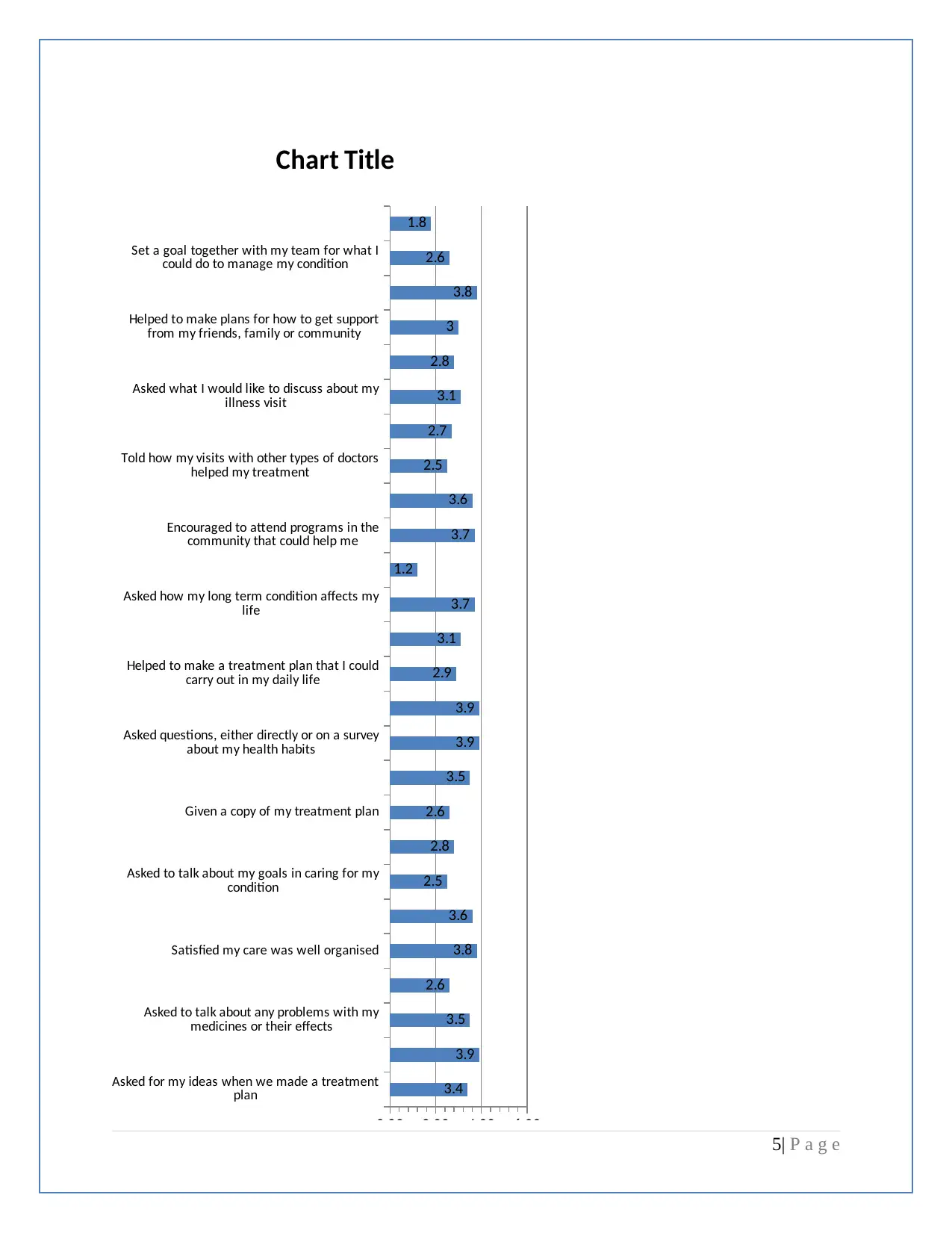
Asked for my ideas when we made a treatment
plan
Asked to talk about any problems with my
medicines or their effects
Satisfied my care was well organised
Asked to talk about my goals in caring for my
condition
Given a copy of my treatment plan
Asked questions, either directly or on a survey
about my health habits
Helped to make a treatment plan that I could
carry out in my daily life
Asked how my long term condition affects my
life
Encouraged to attend programs in the
community that could help me
Told how my visits with other types of doctors
helped my treatment
Asked what I would like to discuss about my
illness visit
Helped to make plans for how to get support
from my friends, family or community
Set a goal together with my team for what I
could do to manage my condition
0.00 2.00 4.00 6.00
3.4
3.9
3.5
2.6
3.8
3.6
2.5
2.8
2.6
3.5
3.9
3.9
2.9
3.1
3.7
1.2
3.7
3.6
2.5
2.7
3.1
2.8
3
3.8
2.6
1.8
Chart Title
Mean Score (out of 5)
5| P a g e
plan
Asked to talk about any problems with my
medicines or their effects
Satisfied my care was well organised
Asked to talk about my goals in caring for my
condition
Given a copy of my treatment plan
Asked questions, either directly or on a survey
about my health habits
Helped to make a treatment plan that I could
carry out in my daily life
Asked how my long term condition affects my
life
Encouraged to attend programs in the
community that could help me
Told how my visits with other types of doctors
helped my treatment
Asked what I would like to discuss about my
illness visit
Helped to make plans for how to get support
from my friends, family or community
Set a goal together with my team for what I
could do to manage my condition
0.00 2.00 4.00 6.00
3.4
3.9
3.5
2.6
3.8
3.6
2.5
2.8
2.6
3.5
3.9
3.9
2.9
3.1
3.7
1.2
3.7
3.6
2.5
2.7
3.1
2.8
3
3.8
2.6
1.8
Chart Title
Mean Score (out of 5)
5| P a g e
⊘ This is a preview!⊘
Do you want full access?
Subscribe today to unlock all pages.

Trusted by 1+ million students worldwide
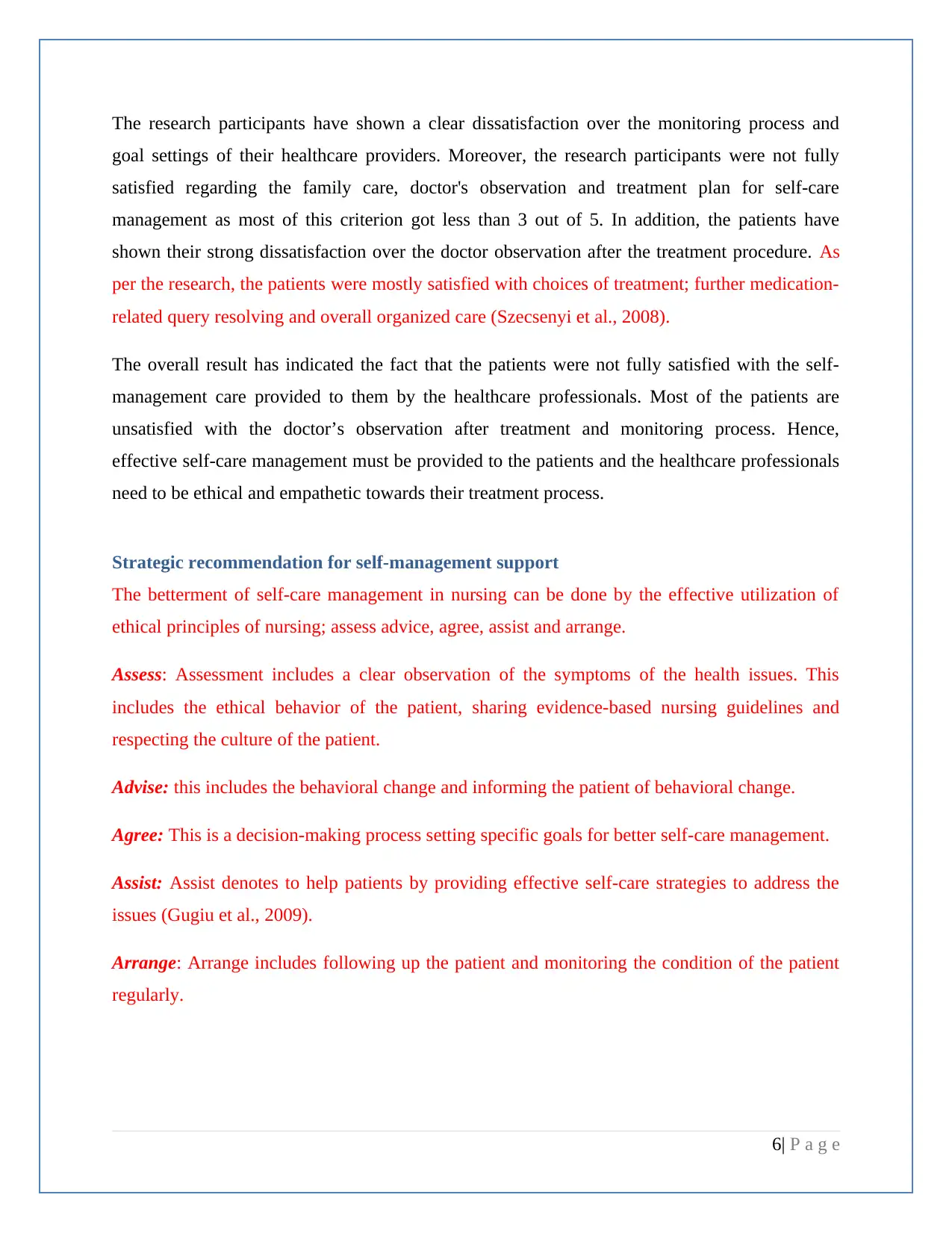
The research participants have shown a clear dissatisfaction over the monitoring process and
goal settings of their healthcare providers. Moreover, the research participants were not fully
satisfied regarding the family care, doctor's observation and treatment plan for self-care
management as most of this criterion got less than 3 out of 5. In addition, the patients have
shown their strong dissatisfaction over the doctor observation after the treatment procedure. As
per the research, the patients were mostly satisfied with choices of treatment; further medication-
related query resolving and overall organized care (Szecsenyi et al., 2008).
The overall result has indicated the fact that the patients were not fully satisfied with the self-
management care provided to them by the healthcare professionals. Most of the patients are
unsatisfied with the doctor’s observation after treatment and monitoring process. Hence,
effective self-care management must be provided to the patients and the healthcare professionals
need to be ethical and empathetic towards their treatment process.
Strategic recommendation for self-management support
The betterment of self-care management in nursing can be done by the effective utilization of
ethical principles of nursing; assess advice, agree, assist and arrange.
Assess: Assessment includes a clear observation of the symptoms of the health issues. This
includes the ethical behavior of the patient, sharing evidence-based nursing guidelines and
respecting the culture of the patient.
Advise: this includes the behavioral change and informing the patient of behavioral change.
Agree: This is a decision-making process setting specific goals for better self-care management.
Assist: Assist denotes to help patients by providing effective self-care strategies to address the
issues (Gugiu et al., 2009).
Arrange: Arrange includes following up the patient and monitoring the condition of the patient
regularly.
6| P a g e
goal settings of their healthcare providers. Moreover, the research participants were not fully
satisfied regarding the family care, doctor's observation and treatment plan for self-care
management as most of this criterion got less than 3 out of 5. In addition, the patients have
shown their strong dissatisfaction over the doctor observation after the treatment procedure. As
per the research, the patients were mostly satisfied with choices of treatment; further medication-
related query resolving and overall organized care (Szecsenyi et al., 2008).
The overall result has indicated the fact that the patients were not fully satisfied with the self-
management care provided to them by the healthcare professionals. Most of the patients are
unsatisfied with the doctor’s observation after treatment and monitoring process. Hence,
effective self-care management must be provided to the patients and the healthcare professionals
need to be ethical and empathetic towards their treatment process.
Strategic recommendation for self-management support
The betterment of self-care management in nursing can be done by the effective utilization of
ethical principles of nursing; assess advice, agree, assist and arrange.
Assess: Assessment includes a clear observation of the symptoms of the health issues. This
includes the ethical behavior of the patient, sharing evidence-based nursing guidelines and
respecting the culture of the patient.
Advise: this includes the behavioral change and informing the patient of behavioral change.
Agree: This is a decision-making process setting specific goals for better self-care management.
Assist: Assist denotes to help patients by providing effective self-care strategies to address the
issues (Gugiu et al., 2009).
Arrange: Arrange includes following up the patient and monitoring the condition of the patient
regularly.
6| P a g e
Paraphrase This Document
Need a fresh take? Get an instant paraphrase of this document with our AI Paraphraser
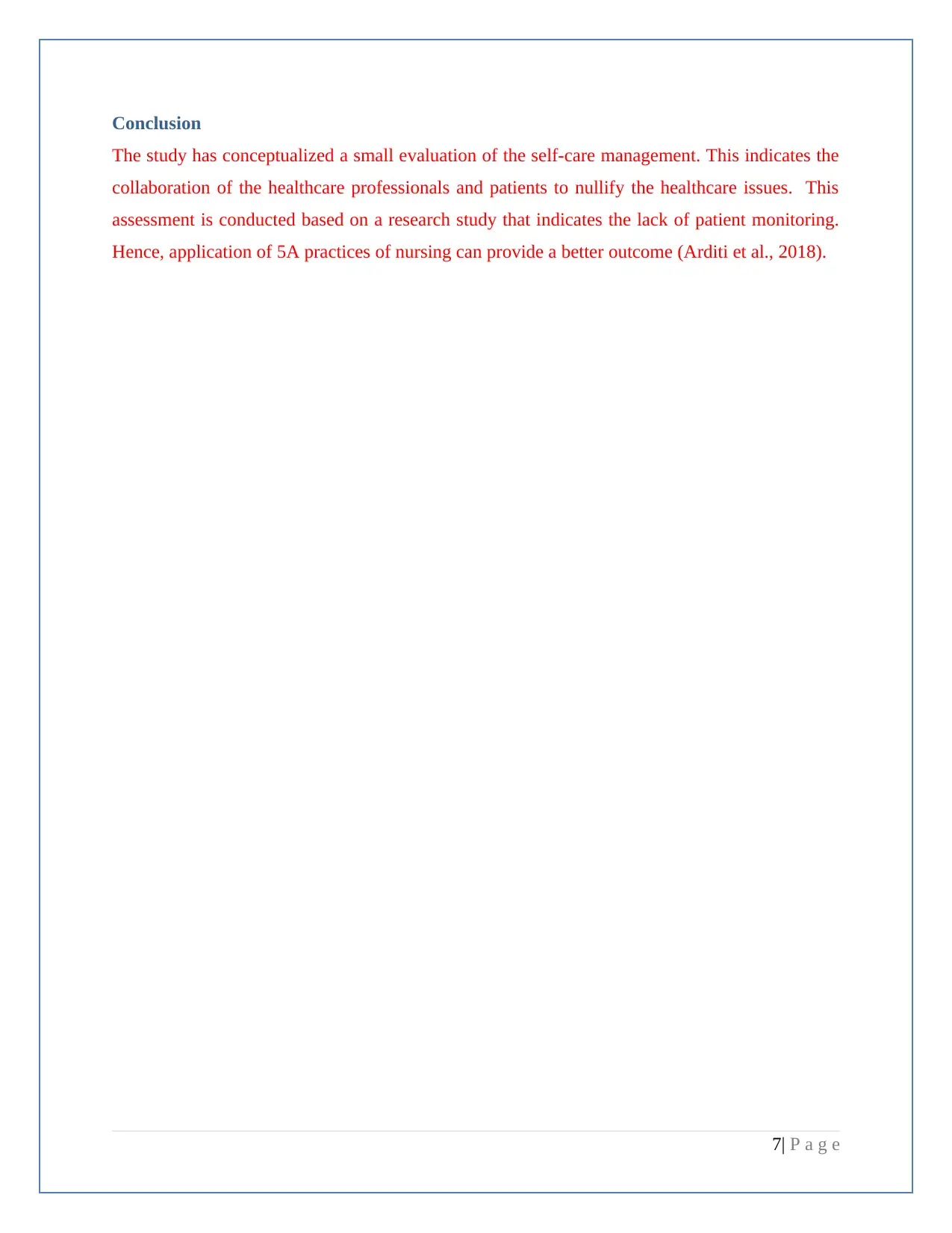
Conclusion
The study has conceptualized a small evaluation of the self-care management. This indicates the
collaboration of the healthcare professionals and patients to nullify the healthcare issues. This
assessment is conducted based on a research study that indicates the lack of patient monitoring.
Hence, application of 5A practices of nursing can provide a better outcome (Arditi et al., 2018).
7| P a g e
The study has conceptualized a small evaluation of the self-care management. This indicates the
collaboration of the healthcare professionals and patients to nullify the healthcare issues. This
assessment is conducted based on a research study that indicates the lack of patient monitoring.
Hence, application of 5A practices of nursing can provide a better outcome (Arditi et al., 2018).
7| P a g e
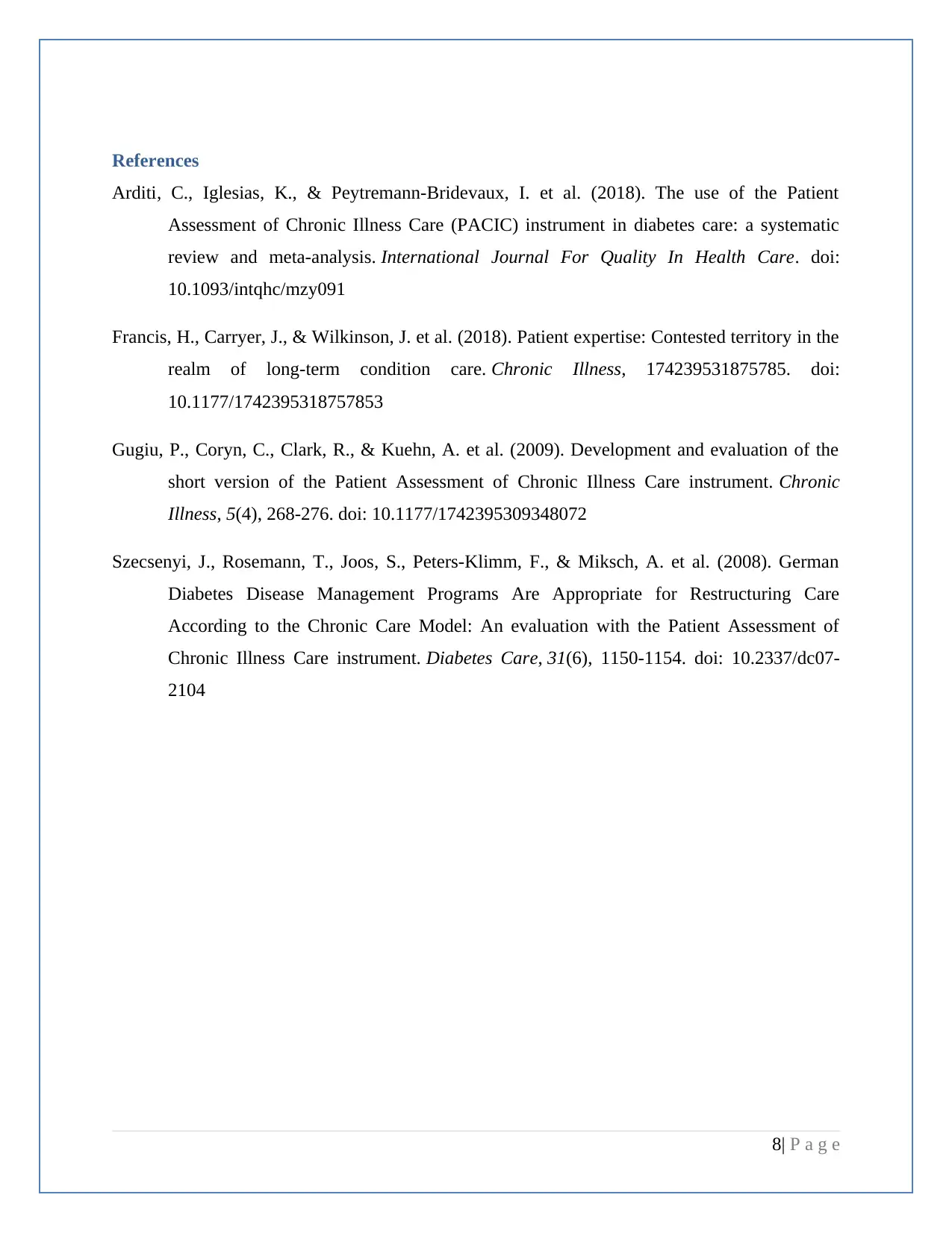
References
Arditi, C., Iglesias, K., & Peytremann-Bridevaux, I. et al. (2018). The use of the Patient
Assessment of Chronic Illness Care (PACIC) instrument in diabetes care: a systematic
review and meta-analysis. International Journal For Quality In Health Care. doi:
10.1093/intqhc/mzy091
Francis, H., Carryer, J., & Wilkinson, J. et al. (2018). Patient expertise: Contested territory in the
realm of long-term condition care. Chronic Illness, 174239531875785. doi:
10.1177/1742395318757853
Gugiu, P., Coryn, C., Clark, R., & Kuehn, A. et al. (2009). Development and evaluation of the
short version of the Patient Assessment of Chronic Illness Care instrument. Chronic
Illness, 5(4), 268-276. doi: 10.1177/1742395309348072
Szecsenyi, J., Rosemann, T., Joos, S., Peters-Klimm, F., & Miksch, A. et al. (2008). German
Diabetes Disease Management Programs Are Appropriate for Restructuring Care
According to the Chronic Care Model: An evaluation with the Patient Assessment of
Chronic Illness Care instrument. Diabetes Care, 31(6), 1150-1154. doi: 10.2337/dc07-
2104
8| P a g e
Arditi, C., Iglesias, K., & Peytremann-Bridevaux, I. et al. (2018). The use of the Patient
Assessment of Chronic Illness Care (PACIC) instrument in diabetes care: a systematic
review and meta-analysis. International Journal For Quality In Health Care. doi:
10.1093/intqhc/mzy091
Francis, H., Carryer, J., & Wilkinson, J. et al. (2018). Patient expertise: Contested territory in the
realm of long-term condition care. Chronic Illness, 174239531875785. doi:
10.1177/1742395318757853
Gugiu, P., Coryn, C., Clark, R., & Kuehn, A. et al. (2009). Development and evaluation of the
short version of the Patient Assessment of Chronic Illness Care instrument. Chronic
Illness, 5(4), 268-276. doi: 10.1177/1742395309348072
Szecsenyi, J., Rosemann, T., Joos, S., Peters-Klimm, F., & Miksch, A. et al. (2008). German
Diabetes Disease Management Programs Are Appropriate for Restructuring Care
According to the Chronic Care Model: An evaluation with the Patient Assessment of
Chronic Illness Care instrument. Diabetes Care, 31(6), 1150-1154. doi: 10.2337/dc07-
2104
8| P a g e
⊘ This is a preview!⊘
Do you want full access?
Subscribe today to unlock all pages.

Trusted by 1+ million students worldwide
1 out of 9
Related Documents
Your All-in-One AI-Powered Toolkit for Academic Success.
+13062052269
info@desklib.com
Available 24*7 on WhatsApp / Email
![[object Object]](/_next/static/media/star-bottom.7253800d.svg)
Unlock your academic potential
Copyright © 2020–2026 A2Z Services. All Rights Reserved. Developed and managed by ZUCOL.





